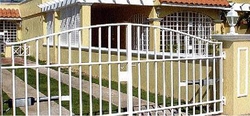'JAILED' AT HOME - Crime sends Jamaicans behind gates
Published: Sunday | December 6, 2009

Daraine Luton, Senior Staff Reporter
At least one group of realtors is predicting that Jamaica may be overrun by gated communities should the Government fail to get crime under control.
"Most of the developments going forward are going to be gated communities. People feel more secure in these properties. The price for these units is much higher, but they sell faster," said Edwin Wint, president of the Realtors' Association of Jamaica.
Gated communities have sprung up across the island like daisies within the past five years, as residents try to keep out non-residents.
"It is the fear of crime that has caused people to put up walls, gates and burglar bars," Assistant Commissioner of Police John McLean said.
Reflects badly on police
McLean, who is head of the police Community and Security Branch, said while the erection of physical barriers might reflect badly on the Jamaica Constabulary Force, it went way beyond the police's ability to deliver service.
"You are dealing with a social problem," McLean said.
The senior police officer commented that people had a legitimate right to protect their properties, and that people would employ whatever tools they could to make them feel more secure, whether it was the use of burglar bars, private security or closed-circuit television.
And it is this need for security that has Jamaicans being more than willing to pay big bucks for some properties. Wint said gated community units may start as low as $9 million for sale, or $70,000 monthly for rent. He said this price outstrips that which persons may pay for non-gated units.
"The price differential can be as much as 20 per cent gated as opposed to non-gated, but people want to feel secure in their properties, and they pay to live in these communities," Wint said.
Dr Carol Archer, dean of the Faculty of the Built Environment at the University of Technology, agrees that the movement towards the building of gated communities is a response to criminality. She, however, said the change was also directly related to land availability.
"Gated communities address the whole question of density, which is a land-use change," Archer said.
Meanwhile, Wint said that gated communities did not separate the rich from the not-so-rich in society.
"It is not a very discriminatory situation because you have lower middle-income communities that are also gated, even though it is the norm for the upper-level ones to be gated," said Wint.
He added: "People prefer to invest in them because they see it as a better investment, and some people will not live in anything that is not secured. Everything goes right back to the high crime rate. Ten years ago you could hardly find a gated community in Montego Bay. They had a fairly low crime rate then. The crime rate has escalated there, and now you find that they are going more and more into gated communities," Wint added.
Archer said that while these communities represent a pragmatic approach to solving housing needs, they have some serious drawbacks.
"One of the downsides to gated communities is that people may get isolated. A group of people of like mind, like socio-economic background - almost like in breeding.
"From a planning perspective, the ideal community is one that has a mixture of persons of varying income and racial group and varying social, occupational and educational class, and it allows for that level of interaction that fosters positive growth and development rather than being an elitist-type community," Archer said.









